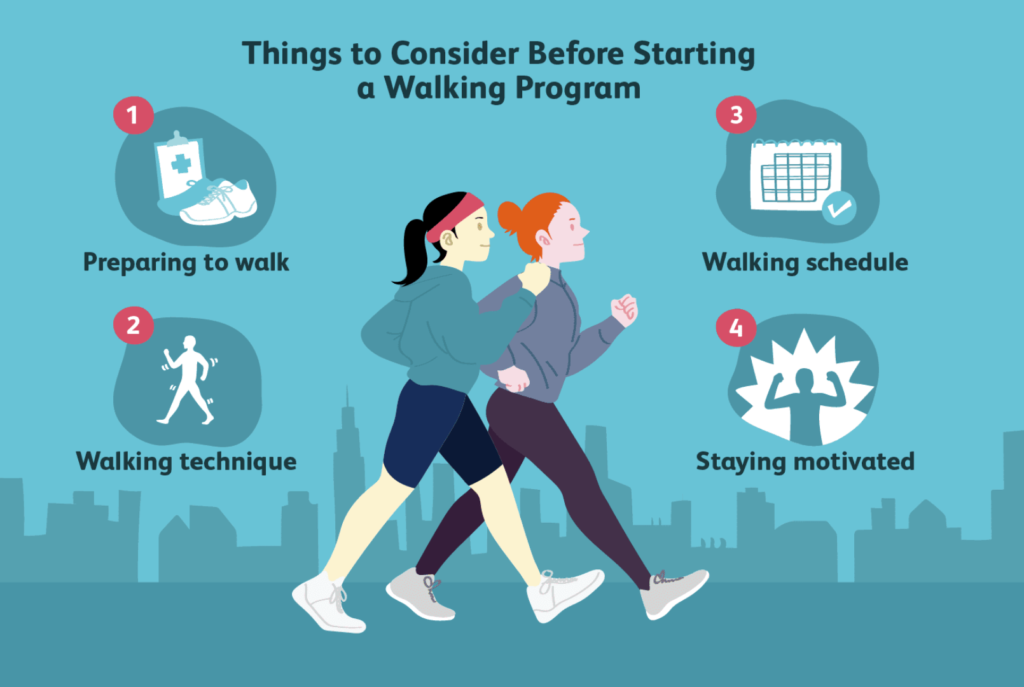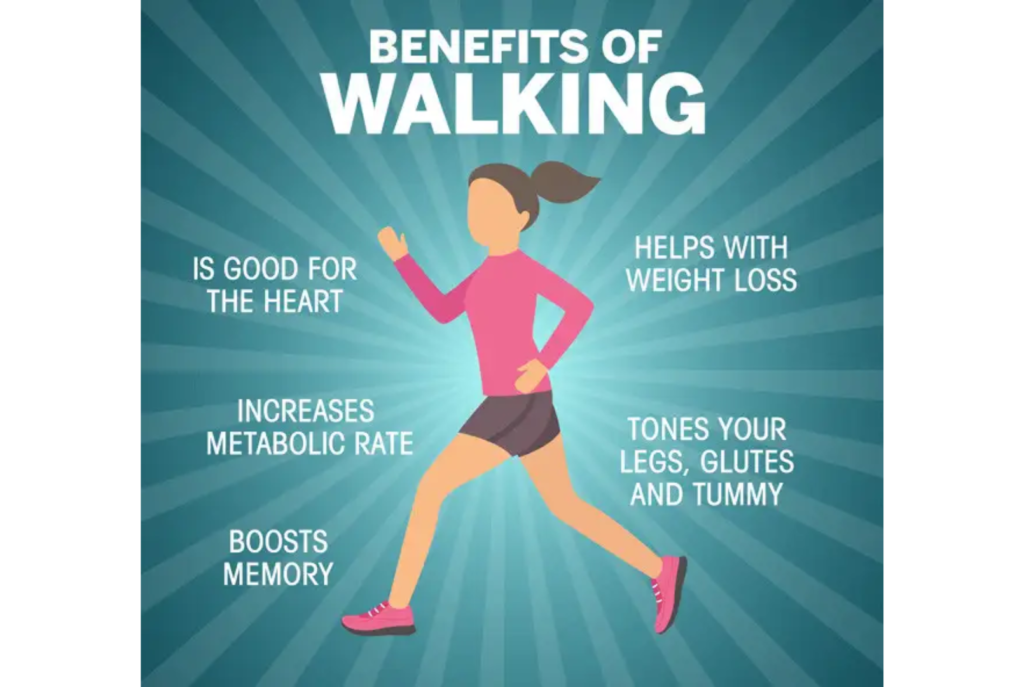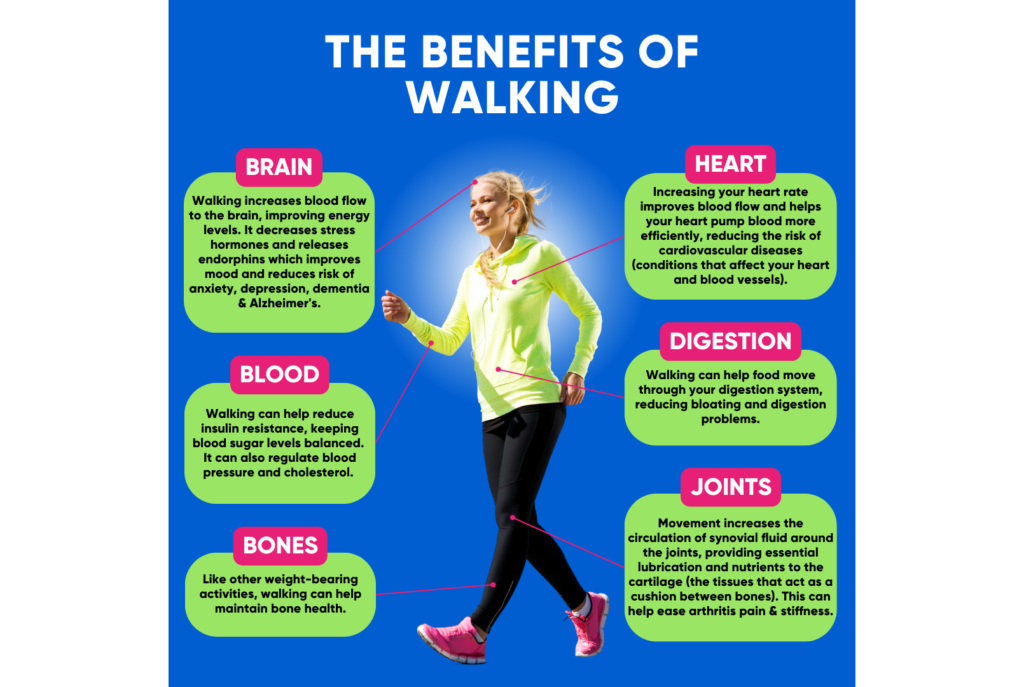
Table of Contents

Introduction
Walking is one of the simplest and most natural forms of exercise available to everyone. It doesn’t require any special equipment or extensive training, making it an accessible activity for people of all ages and fitness levels. Whether it’s a leisurely stroll through the park or a brisk walk around the neighborhood, walking can be seamlessly integrated into daily routines, offering a host of benefits of walking for both physical and mental health.
In a world where high-intensity workouts often take center stage, the importance of walking is frequently overshadowed. However, this basic activity should be celebrated for its profound impact on health and well-being. As a low-impact, sustainable form of exercise, walking encourages a more active lifestyle and is a fundamental part of any wellness plan.
This blog explores the importance of walking and why it should be prioritized in our daily lives. Whether you are beginning your fitness journey or looking to enhance your overall health, walking could be the perfect solution for you. As noted, “Walking is a simple yet powerful way to improve both physical and mental health. It is a fundamental activity that allows individuals to reconnect with their bodies and nature.”
Prime Minister Modi’s Thoughts on Walking

Prime Minister Narendra Modi has consistently emphasized the importance of walking for health and well-being. In various public addresses, he has advocated for incorporating walking into daily routines and even encourages citizens to aim for 10,000 steps a day. His vision of a healthier, more active nation aligns perfectly with the benefits of walking, making it a cornerstone of his public health initiatives.
Why Walking is Important

Walking is not just about moving from one place to another; it is a holistic activity that enriches life in numerous ways. Below, we delve into the key reasons why walking should be an integral part of your daily routine, focusing on the benefits of walking.
Physical Health Benefits of Walking
- Walking Improves Cardiovascular Health: Regular brisk walking strengthens the heart, improves circulation, and can significantly lower the risk of heart disease. Studies show that walking for just 30 minutes a day can reduce the risk of coronary heart disease by up to 19%. Moreover, walking helps to lower “bad” cholesterol (LDL) and increases “good” cholesterol (HDL). It also promotes healthier blood pressure by improving the efficiency of the heart.
- Walking Aids in Weight Loss and Weight Management: For those aiming to shed some pounds or maintain a healthy weight, walking is an ideal exercise. It is a low-impact activity that burns calories and increases metabolism without putting unnecessary strain on your joints. A brisk 30-minute walk can burn anywhere between 150 to 200 calories, depending on your pace and body weight. More importantly, walking is a practical way to reduce visceral fat (belly fat), which is associated with various health risks. Pairing walking with mindful eating can accelerate your weight loss journey. Learn how portion control plays a vital role in achieving long-term results
- Walking Improves Bone Health and Joint Mobility: Walking is a weight-bearing exercise, meaning it helps maintain and build bone density. This is especially important for preventing osteoporosis, a condition that leads to weakened bones. Regular walking stimulates the production of bone cells, making bones stronger and reducing the risk of fractures. Moreover, walking is easy on the joints, helping lubricate joints and strengthening the muscles around them.
- Walking Enhances Digestion and Supports Gut Health: Walking can do wonders for your digestive system. Taking a walk after meals promotes the movement of food through the digestive tract, aiding in digestion and helping to prevent issues such as bloating, constipation, and indigestion.
- Walking Boosts Energy and Reduces Fatigue: Contrary to popular belief, walking can boost energy levels rather than deplete them. It increases the flow of oxygen in the bloodstream, helping circulate essential nutrients to cells. Many people experience a noticeable rise in energy after a quick walk, especially when they start feeling sluggish.
- Accessible for All Fitness Levels: One of the best things about walking is its accessibility. Unlike other forms of exercise that require specialized equipment or training, walking is something nearly everyone can do. It’s a low-impact, adaptable activity that can be modified to suit individual fitness levels.

Mental Health Benefits of Walking
- Walking Supports Mental Health and Well-Being: Walking doesn’t just benefit your physical health—it has profound effects on mental well-being too. Many people report feeling calmer and more focused after a walk, with stress, anxiety, and symptoms of depression significantly reduced. Walking encourages the release of endorphins, commonly known as “feel-good” hormones.
- Walking Boosts Creativity and Problem-Solving Skills: Many great thinkers, like Steve Jobs and Charles Darwin, used walking as a way to enhance creativity. Research shows that walking helps stimulate creative thinking by allowing your mind to wander while your body engages in repetitive motion.
- Walking Promotes Better Sleep: If you struggle with sleep, regular walks could be the solution. Walking helps regulate your sleep-wake cycle and promotes more restful sleep, particularly if done earlier in the day. By getting natural light exposure while walking outdoors, your circadian rhythm stabilizes.
- Walking Strengthens Social Connections: Walking can be a wonderful social activity that fosters stronger relationships. Whether it’s a leisurely stroll with family members or a brisk walk with friends, walking together provides an opportunity to bond and share meaningful moments.
- Walking Supports Mental Clarity and Focus: Walking, especially in natural surroundings, can lead to improved concentration and clarity. The act of moving while thinking can lead to breakthroughs in thought processes and increased productivity.

Accessibility and Simplicity
- Low Barrier to Entry: Walking requires no special equipment or training, making it accessible to people of all ages and fitness levels. It can be easily incorporated into daily routines, whether through brisk walks during breaks or leisurely strolls in the neighborhood.
- Flexible Duration: Even short bouts of walking—like a 10-minute brisk walk—can contribute to overall health. The recommended goal is at least 150 minutes of moderate-intensity walking per week, which can be broken down into manageable segments.
How to Incorporate Walking into Your Routine

Incorporating walking into your daily life is easier than you might think.
Here are some practical tips to help you make walking a regular habit:
- Set Achievable Goals: Start by setting small, manageable goals, such as walking for 10 minutes after each meal. Slowly extend the length of your walks as you gain confidence in enjoying the benefits of walking.
- Choose Walking Over Driving: For short distances, consider walking instead of driving. Not only will this help you incorporate more steps into your day, but it can also reduce your carbon footprint.
- Take Brisk Walks During Breaks: Use your lunch break or work breaks to take a brisk walk. This not only adds to your step count but also refreshes your mind for the rest of the day.
- Make it Social: Invite family members or friends to join you on walks. This turns exercise into a fun, social activity and helps you stay motivated while enjoying the benefits of walking.
- Utilize Technology: Consider using a pedometer or a walking app to track your steps and set goals. Many smartphones have built-in pedometers that make it easy to monitor your progress and celebrate the benefits of walking.
- Explore Nature: If possible, choose walking routes that take you through parks or nature trails. The sights and sounds of nature can enhance the experience and make walking more enjoyable.
Conclusion: Make Walking a Daily Habit

Incorporating walking into your daily routine is one of the easiest and most effective ways to improve your overall health. The benefits of walking include enhanced cardiovascular health, boosted mood, weight management, and strengthened bones. Whether you’re aiming for 10,000 steps or just starting with a quick walk around your neighborhood, every step counts.
As Dt. Anup Agharwal notes, “Walking is an underrated but powerful tool for improving both physical and mental health.” By prioritizing walking in our daily lives, we can take significant strides toward better health and well-being.
So, lace up your shoes, step outside, and start walking today. The path to a healthier, happier life is right at your feet, and the benefits of walking await you.
FAQs
1. How many steps should I walk daily for health benefits?
A. Most experts recommend aiming for at least 10,000 steps per day. However, any amount of walking is beneficial, and starting with 5,000 steps and gradually increasing can still provide health benefits.
2. Can walking help with weight loss?
A. Yes, walking can aid in weight loss by burning calories and increasing your metabolism. Combining walking with a balanced diet can be effective for achieving and maintaining a healthy weight.
3. Is walking suitable for all fitness levels?
A. Absolutely! Walking is a low-impact exercise that can be adapted to suit any fitness level. You can start slowly and gradually increase your speed and distance as your fitness improves.
4. What are the best times to walk?
A. You can walk at any time of day that fits your schedule. Walking in the morning can boost your energy for the day, whereas evening walks can help you relax. Ultimately, the best time to walk is when you can consistently incorporate it into your routine.
5. Do I need special shoes for walking?
A. While it’s not necessary to have special shoes, wearing comfortable, supportive shoes designed for walking can enhance your experience and prevent discomfort.
6. Can walking help improve my mood?
A. Yes! Walking has been shown to release endorphins, which can enhance mood and alleviate feelings of stress, anxiety, and depression.
7. What strategies can I use to maintain my motivation for regular walking?
A. Setting specific goals, tracking your progress, joining walking groups, or finding a walking buddy can help keep you motivated and accountable.
8. Can I walk indoors?
A. Definitely! Walking indoors on a treadmill or around your home is a great alternative, especially during inclement weather.
9. What are the long-term benefits of walking?
A. Long-term walking can lead to improved cardiovascular health, better weight management, enhanced mental health, and a reduced risk of chronic diseases.
10. How do I start a walking routine?
A. Start small by incorporating short walks into your daily schedule. Gradually increase the duration and intensity as you become more comfortable, and remember to enjoy the process! By making walking a daily habit, you can unlock numerous health benefits and lead a happier, healthier life.

🎯 10+ years of Experience
🎓 10k+ Trained ( 📍 Jaipur )
💪 Helping change people’s lives
🌿 Most trusted lifestyle counselor